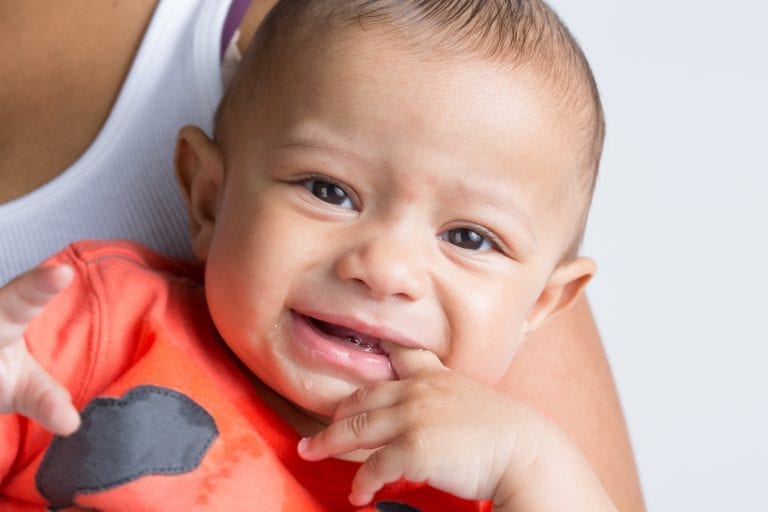Teething Time!
These teething time tips will help your baby cut their chompers with as little pain as possible.
There’s not a mom out there who hasn’t gazed down at their infant and wondered with a mix of curiosity and fear, “when will my baby get their first tooth?”
Teething ranks right up there among the highest stressors infants face, experts know, because along with the new pearly whites come loads of fussiness as they cut through your little one’s gums. do you know that your baby was born with their tooth buds already embedded in her gums?
First Tooth
Long before you ever see the first edge of a tooth pushing its way into your baby’s mouth, you may notice that they are a lot more fussy than usual, they are drooling, want to nurse or feed more often and may have a low-grade fever (up to 100.9⁰F). Your baby may also want to put everything in their mouth and chew with their gums. Excess saliva may cause a rash around the face and they may refuse to nurse although they seem interested in nursing.
Contrary to popular beliefs, teething doesn’t give your baby a high fever (101⁰F or more) or diarrhea. When these symptoms are present, it’s time to see your pediatrician.
Although babies can even be born with a tooth or 2 already in, they will get their 2 bottom and 2 top front teeth in that order before their molars and side teeth emerge. By their 3rd birthday, babies should have 20 teeth in total. As their teeth debut, you may even see small cysts on the gums where the tooth below is breaking through.
Easing Teething
You can help your baby ease into their teeth with minimal discomfort by practicing good gum care from birth. Ask your dentist for or purchase a finger-sock-like baby toothbrush or use a washcloth and begin massaging their gums with cool water on a regular basis. Skip the toothpaste until they’re age 3 and can swish and spit it out, say experts at the American Dental Association.
It’s time for your baby’s first visit to a pediatric dentist when they have 8 teeth in their mouth, which is typically around age 1. Starting early with good dental care will not only help your baby with her first set of teeth but will also protect permanent teeth from bacteria and decay as they’re forming in the gums, and until they begin to make their first appearances around age 6.
Give your baby something cold to mash their gums against to reduce pain and swelling while teething. Avoid pain medications (infant Tylenol is OK) unless nothing else soothes them
Natural Teething Strategies
- A cold or frozen clean washcloth
- A silicone or natural teether (avoid ones with liquids as they can leak or be bitten through)
- Soft baby foods, like applesauce or yogurt
- Frozen fruit safely contained in a “mashing” bag designed for babies to chew on
- Teething crackers
Further reading for teething time: Tips on Dealing with Baby’s Teething
We have a range of articles for your Baby’s Milestones:
First Words: Better Baby Babble






Comments are closed.